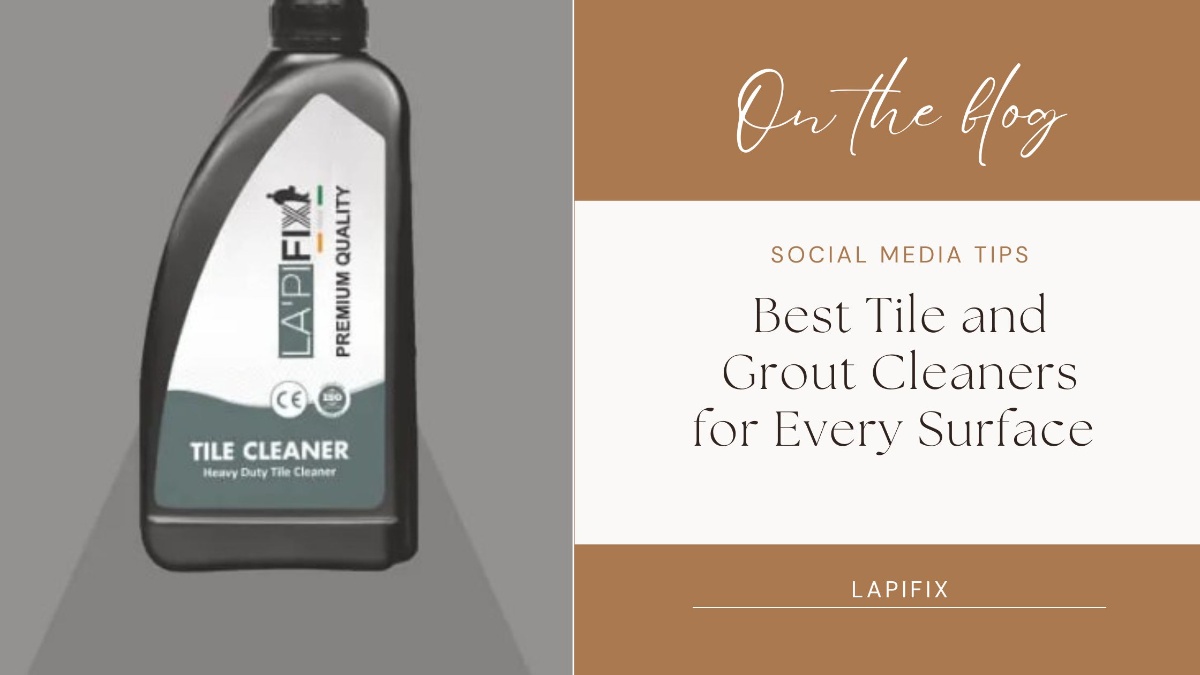


Sustaining tile appearance together with their durability in bathroom and kitchen and outdoor settings demands the best tile and grout cleaning products. Each tile requires a different type of cleaning solution because their composition varies from one to another. What follows will be an analysis of the cleaning solutions which work best for different types of surfaces to uphold pristine environments.
1. Ceramic Tile & Grout Cleaners
2. Porcelain Tile Cleaners
3. Natural Stone Tile Cleaners (Marble, Granite, Travertine)
4. Outdoor Tiles (Slate, Concrete, Pavers)
5. Epoxy Grout Cleaners
6. Steam Cleaning for Grout and Tiles
7. Grout Sealer (Post-Cleaning Must-Have)
Best For: Kitchen floors, bathrooms, backsplashes
Recommended Cleaner: pH-neutral tile cleaner or vinegar-based solution
Why it Works:
Ceramic tiles present durability since they maintain their quality well but grout lines provide hiding areas for dirt and grease accumulation.
The balanced pH level of the mixture protects finish quality by avoiding damage to tile surfaces.
Top Pick:
The powerful concentrated neutral detergent called FILA Cleaner Pro shows excellence in cleaning both ceramic tiles and glazed surfaces effectively. Safe for daily use.
Best For: Bathroom walls, floors, kitchen counters
Recommended Cleaner: Mild alkaline or hydrogen peroxide-based cleaner
Why it Works:
The maintenance of porcelain tiles requires softcare because they absorb residue quickly due to being non-porous.
Waxy and oily cleaning agents must be avoided because they create visible streaks on surfaces.
Top Pick:
Black Diamond Stoneworks Porcelain Tile Cleaner functions perfectly against grease and remains harmless to daily cleaning tasks while leaving no sticky residue behind.
Best For: Premium bathroom/kitchen floors, countertops
Recommended Cleaner: Stone-safe, pH-balanced cleaners – no acids or vinegar
Users should never employ vinegar acid in lemon products because these liquids tend to harm natural stone surfaces.
Top Pick:
Among all cleaners The Granite Gold Daily Cleaner emerges as the best solution for sustaining natural stone materials through its specific design. The cleaning solution ensures safety for surfaces as part of its operation.
Patio surfaces and balconies together with garden paths benefit best from outdoor tiles made from slate and concrete and pavers.
Recommended Cleaner: Heavy-duty alkaline or oxygenated cleaner
Why it Works:
Outdoor tiles absorb numerous outdoor pollutants which include earth and fungal and algal and discoloring substances.
Thorough cleaning occurs with oxygen bleach compounds and sodium percarbonate-based products that protect color intensity.
Top Pick:
OxiClean Versatile Stain Remover (for outdoor) functions excellently as an outdoor cleaning solution because it works with water to eliminate both mold and outdoor stains and soiling.
Showers and commercial kitchens together with waterproof locations serve best when using this type of product.
Recommended Cleaner: Ammonia-free degreasers or enzyme-based cleaners
Why it Works:
The stain resistance of Epoxy grout remains high but it develops build up when exposed to soaps and oils.
Grease and dirt removal formulas that lack abrasive properties safeguard the surface gloss of grout tiles.
Top Pick:
The Rejuvenate Grout Deep Cleaner proves to be the primary selection due to its capability to clean grout with enzymes while being safe for epoxy and sanded grout types and non-toxic with increased strength.
Pro Tip: DIY Natural Cleaner Recipe
For light cleaning:
Melt one quarter of vinegar with the same amount of warm water and drop in some dish soap to start.
For natural stone materials apply only a mixture of water along with mild dish soap because vinegar serves as a cleaner that should always be avoided.
The device effectively removes deep grout stains through its elimination of chemical substances.
The Dupray Neat Steam Cleaner eliminates all germs at a rate above 99.9% by performing its operations through a water-only system. Great for tiles, grout, and sealed hardwood floors.
Keeping clean grout sealants applied will stop new stains from occurring.
Top Pick:
Aqua Mix Sealer's Choice Gold – Premium sealer for grout, natural stone, and porcelain. Provides long-lasting protection.
Recommended: RMR-86 Instant Mold & Mildew Stain Remover
This product dissolves black mold stains in grout and caulking as well as shower tiles right after application.
Best for: Bathroom grout, shower corners, and damp areas.
This product requires only spraying and rinsing without manual scrubbing.
Recommended: Zep Heavy-Duty Citrus Degreaser
It eliminates both food stains and cooking grease along with accumulated dirt.
Best for: Kitchen backsplashes and ceramic or porcelain floor tiles.
Recommended: Grout Pen (with cleaning formula)
This product cleans the surface lightly while restoring faded colored grout lines through its tinted finish.
This solution provides the best outcome to refresh decorative grout without requiring grout replacement.
Recommended: Soft Scrub with Bleach Cleanser
The cleaning solution showers stains then restabilizes discolored grout lines.
Best for: Restoring bright white grout in showers or countertops.
Recommended: Bubba’s Super Strength Commercial Enzyme Cleaner
Enzymes contained in Bubba’s Super Strength Commercial Enzyme Cleaner help dissolve organic stains including those left by pets or food and mildew.
The product suits homes with pets that have tile flooring in their living rooms.
A modern cleaning device known as the Electric Spin Scrubber operates to make grout scrubbing very easy for users.
Grout Brushes (Angled/Bristle): Targets narrow lines and deep stains.
Microfiber Mop: Ideal for large tile floor maintenance.
Grout Cleaning Steam Machine: Chemical-free solution for deep sanitization.
Dipping between cleaning the tiles with regular mops and executing intensive grout cleanup should occur about two or three times per quarter. Regular grout sealing during every 6 to 12 months period helps minimize the requirement for comprehensive cleaning tasks.
Yes, but only on ceramic or porcelain tiles. The acid in vinegar will create etched areas on the surface of marble and travertine natural stone products.
To clean heavily stained grout properly you should apply OxiClean oxygen bleach powder for 15–20 minutes then scrub with a strong brush before rinsing it off. You should consider using grout pen recoloring alongside the steam cleaning method for extremely persistent stains.
Bleach is safe to use periodically on grout although continuous use should be limited because it will eventually weaken the grout structure. Bleach-based cleaning solutions should be limited in use because thorough rinsing is required after application.
Proper ventilation alongside regular cleaning procedures along with grout sealer application every six to twelve months will stop moisture from entering and damaging the area.
Young professionals should consider replacement grout instead of cleaning when the current grout condition indicates crumbling or cracking or having fallen out.
The appropriate method for discoloration, mildew, or surface grime treatment is cleaning because it lacks the ability to handle serious structural damage.